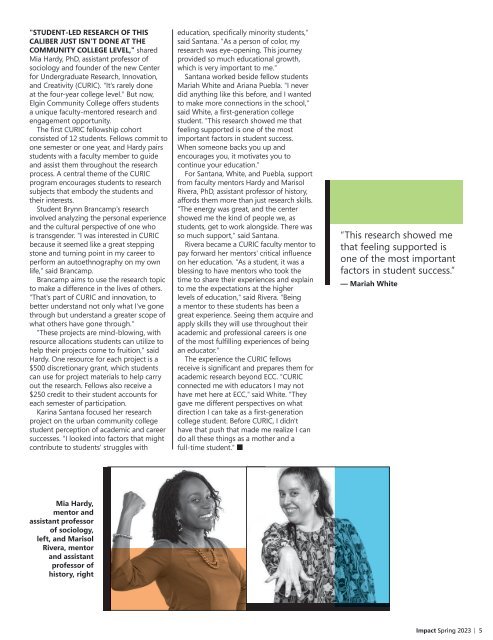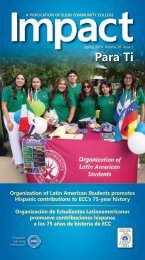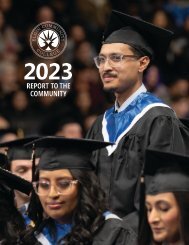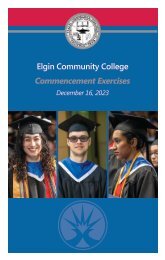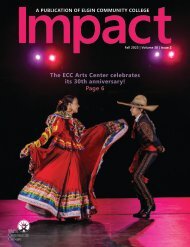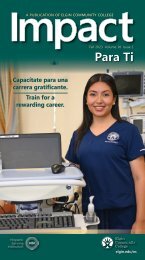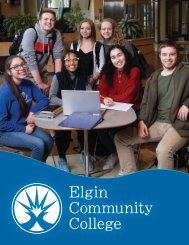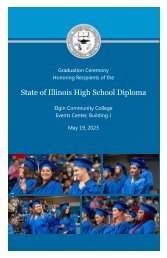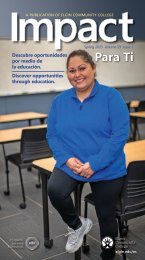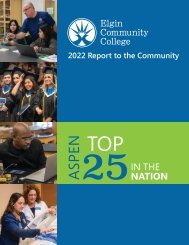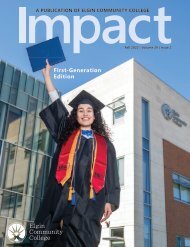Impact Magazine - Spring 2023 | Elgin Community College
Impact Magazine is a bi-annual publication.
Impact Magazine is a bi-annual publication.
You also want an ePaper? Increase the reach of your titles
YUMPU automatically turns print PDFs into web optimized ePapers that Google loves.
"STUDENT-LED RESEARCH OF THIS<br />
CALIBER JUST ISN'T DONE AT THE<br />
COMMUNITY COLLEGE LEVEL," shared<br />
Mia Hardy, PhD, assistant professor of<br />
sociology and founder of the new Center<br />
for Undergraduate Research, Innovation,<br />
and Creativity (CURIC). "It's rarely done<br />
at the four-year college level." But now,<br />
<strong>Elgin</strong> <strong>Community</strong> <strong>College</strong> offers students<br />
a unique faculty-mentored research and<br />
engagement opportunity.<br />
The first CURIC fellowship cohort<br />
consisted of 12 students. Fellows commit to<br />
one semester or one year, and Hardy pairs<br />
students with a faculty member to guide<br />
and assist them throughout the research<br />
process. A central theme of the CURIC<br />
program encourages students to research<br />
subjects that embody the students and<br />
their interests.<br />
Student Brynn Brancamp's research<br />
involved analyzing the personal experience<br />
and the cultural perspective of one who<br />
is transgender. "I was interested in CURIC<br />
because it seemed like a great stepping<br />
stone and turning point in my career to<br />
perform an autoethnography on my own<br />
life," said Brancamp.<br />
Brancamp aims to use the research topic<br />
to make a difference in the lives of others.<br />
"That's part of CURIC and innovation, to<br />
better understand not only what I've gone<br />
through but understand a greater scope of<br />
what others have gone through."<br />
"These projects are mind-blowing, with<br />
resource allocations students can utilize to<br />
help their projects come to fruition," said<br />
Hardy. One resource for each project is a<br />
$500 discretionary grant, which students<br />
can use for project materials to help carry<br />
out the research. Fellows also receive a<br />
$250 credit to their student accounts for<br />
each semester of participation.<br />
Karina Santana focused her research<br />
project on the urban community college<br />
student perception of academic and career<br />
successes. "I looked into factors that might<br />
contribute to students' struggles with<br />
education, specifically minority students,"<br />
said Santana. "As a person of color, my<br />
research was eye-opening. This journey<br />
provided so much educational growth,<br />
which is very important to me."<br />
Santana worked beside fellow students<br />
Mariah White and Ariana Puebla. "I never<br />
did anything like this before, and I wanted<br />
to make more connections in the school,"<br />
said White, a first-generation college<br />
student. "This research showed me that<br />
feeling supported is one of the most<br />
important factors in student success.<br />
When someone backs you up and<br />
encourages you, it motivates you to<br />
continue your education."<br />
For Santana, White, and Puebla, support<br />
from faculty mentors Hardy and Marisol<br />
Rivera, PhD, assistant professor of history,<br />
affords them more than just research skills.<br />
"The energy was great, and the center<br />
showed me the kind of people we, as<br />
students, get to work alongside. There was<br />
so much support," said Santana.<br />
Rivera became a CURIC faculty mentor to<br />
pay forward her mentors' critical influence<br />
on her education. "As a student, it was a<br />
blessing to have mentors who took the<br />
time to share their experiences and explain<br />
to me the expectations at the higher<br />
levels of education," said Rivera. "Being<br />
a mentor to these students has been a<br />
great experience. Seeing them acquire and<br />
apply skills they will use throughout their<br />
academic and professional careers is one<br />
of the most fulfilling experiences of being<br />
an educator."<br />
The experience the CURIC fellows<br />
receive is significant and prepares them for<br />
academic research beyond ECC. "CURIC<br />
connected me with educators I may not<br />
have met here at ECC," said White. "They<br />
gave me different perspectives on what<br />
direction I can take as a first-generation<br />
college student. Before CURIC, I didn't<br />
have that push that made me realize I can<br />
do all these things as a mother and a<br />
full-time student." ■<br />
“This research showed me<br />
that feeling supported is<br />
one of the most important<br />
factors in student success.”<br />
— Mariah White<br />
Mia Hardy,<br />
mentor and<br />
assistant professor<br />
of sociology,<br />
left, and Marisol<br />
Rivera, mentor<br />
and assistant<br />
professor of<br />
history, right<br />
<strong>Impact</strong> <strong>Spring</strong> <strong>2023</strong> | 5


